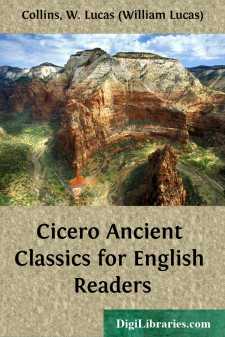Categories
- Antiques & Collectibles 13
- Architecture 36
- Art 48
- Bibles 22
- Biography & Autobiography 813
- Body, Mind & Spirit 142
- Business & Economics 28
- Children's Books 17
- Children's Fiction 14
- Computers 4
- Cooking 94
- Crafts & Hobbies 4
- Drama 346
- Education 46
- Family & Relationships 57
- Fiction 11829
- Games 19
- Gardening 17
- Health & Fitness 34
- History 1377
- House & Home 1
- Humor 147
- Juvenile Fiction 1873
- Juvenile Nonfiction 202
- Language Arts & Disciplines 88
- Law 16
- Literary Collections 686
- Literary Criticism 179
- Mathematics 13
- Medical 41
- Music 40
- Nature 179
- Non-Classifiable 1768
- Performing Arts 7
- Periodicals 1453
- Philosophy 64
- Photography 2
- Poetry 896
- Political Science 203
- Psychology 42
- Reference 154
- Religion 513
- Science 126
- Self-Help 84
- Social Science 81
- Sports & Recreation 34
- Study Aids 3
- Technology & Engineering 59
- Transportation 23
- Travel 463
- True Crime 29
Cicero Ancient Classics for English Readers
Categories:
Description:
Excerpt
CHAPTER I.
EARLY LIFE AND EDUCATION.
When we speak, in the language of our title-page, of the 'Ancient Classics', we must remember that the word 'ancient' is to be taken with a considerable difference, in one sense. Ancient all the Greek and Roman authors are, as dated comparatively with our modern era. But as to the antique character of their writings, there is often a difference which is not merely one of date. The poetry of Homer and Hesiod is ancient, as having been sung and written when the society in which the authors lived, and to which they addressed themselves, was in its comparative infancy. The chronicles of Herodotus are ancient, partly from their subject-matter and partly from their primitive style. But in this sense there are ancient authors belonging to every nation which has a literature of its own. Viewed in this light, the history of Thucydides, the letters and orations of Cicero, are not ancient at all. Bede, and Chaucer, and Matthew of Paris, and Froissart, are far more redolent of antiquity. The several books which make up what we call the Bible are all ancient, no doubt; but even between the Chronicles of the Kings of Israel and the Epistles of St. Paul there is a far wider real interval than the mere lapse of centuries.
In one respect, the times of Cicero, in spite of their complicated politics, should have more interest for a modern reader than most of what is called Ancient History. Forget the date but for a moment, and there is scarcely anything ancient about them. The scenes and actors are modern—terribly modern; far more so than the middle ages of Christendom. Between the times of our own Plantagenets and Georges, for instance, there is a far wider gap, in all but years, than between the consulships of Caesar and Napoleon. The habits of life, the ways of thinking, the family affections, the tastes of the Romans of Cicero's day, were in many respects wonderfully like our own; the political jealousies and rivalries have repeated themselves again and again in the last two or three centuries of Europe: their code of political honour and morality, debased as it was, was not much lower than that which was held by some great statesmen a generation or two before us. Let us be thankful if the most frightful of their vices were the exclusive shame of paganism.
It was in an old but humble country-house, neat the town of Arpinum, under the Volscian hills, that Marcus Tullius Cicero was born, one hundred and six years before the Christian era. The family was of ancient 'equestrian'[1] dignity, but as none of its members had hitherto borne any office of state, it did not rank as 'noble'. His grandfather and his father had borne the same three names—the last an inheritance from some forgotten ancestor, who had either been successful in the cultivation of vetches (cicer), or, as less complimentary traditions said, had a wart of that shape upon his nose. The grandfather was still living when the little Cicero was born; a stout old conservative, who had successfully resisted the attempt to introduce vote by ballot into his native town, and hated the Greeks (who were just then coming into fashion) as heartily as his English representative, fifty years ago, might have hated a Frenchman....


